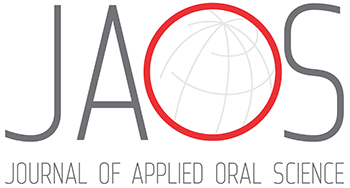In the present study, two types of tests (tensile strength test and polymerization inhibition test) were performed to evaluate the physical and chemical properties of four impression materials [a polysulfide (Permlastic), a polyether (Impregum), a condensation silicone (Xantopren) and a polyvinylsiloxane (Aquasil),3; when polymerized in contact with of one conventional (Hemostop) and two experimental (Vislin and Afrin) gingival retraction solutions. For the tensile strength test, the impression materials were mixed and packed into a steel plate with perforations that had residues of the gingival retraction solutions. After polymerization, the specimens were tested in tensile strength in a universal testing machine. For the polymerization inhibition test, specimens were obtained after taking impressions from a matrix with perforations that contained 1 drop of the gingival retraction solutions. Two independent examiners decided on whether or not impression material remnants remained unpolymerized, indicating interference of the chemical solutions. Based on the analysis of the results of both tests, the following conclusions were reached: 1. The tensile strength of the polysulfide decreased after contact with Hemostop and Afrin. 2. None of the chemical solutions inhibited the polymerization of the polysulfide; 3. The polyether presented lower tensile strength after polymerization in contact with the three gingival retraction agents; 4. The polyether had its polymerization inhibited only by Hemostop; 5. None of the chemical solutions affected the tensile strength of the condensation silicone; 6. Only Hemostop inhibited the polymerization of the condensation silicone; 7. The polyvinylsiloxane specimens polymerized in contact with Hemostop had significantly lower tensile strength; 8. Neither of the chemical solutions (Afrin and Vislin) affected the tensile strength of the polyvinylsiloxane and the condensation silicone; 9. Results of the tensile strength and polymerization inhibition tests suggest that Vislin can be used as substance of gingival retraction without affecting the tested properties of four impression materials.
Gingival retraction; Dental impression materials; Drug effects; Silicone elastomers; Elasticity


